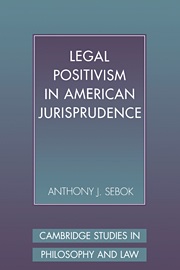Book contents
- Frontmatter
- Contents
- Acknowledgments
- 1 Why Study Legal Positivism?
- 2 Positivism and Formalism
- 3 The Varieties of Formalism
- 4 Legal Process and the Shadow of Positivism
- 5 The False Choice Between the Warren Court and Legal Process
- 6 Fundamental Rights and the Problem of Insatiability
- 7 New Legal Positivism and the Incorporation of Morality
- Index
1 - Why Study Legal Positivism?
Published online by Cambridge University Press: 16 October 2009
- Frontmatter
- Contents
- Acknowledgments
- 1 Why Study Legal Positivism?
- 2 Positivism and Formalism
- 3 The Varieties of Formalism
- 4 Legal Process and the Shadow of Positivism
- 5 The False Choice Between the Warren Court and Legal Process
- 6 Fundamental Rights and the Problem of Insatiability
- 7 New Legal Positivism and the Incorporation of Morality
- Index
Summary
LEGAL POSITIVISM'S CHECKERED
PAST The past forty years have not been kind to legal positivism. Ever since H.L.A. Hart's famous debate with Lon Fuller over the charge that German legal positivists were partly responsible for the rise of Adolf Hitler, positivism has often been the target of frequent attacks by American lawyers. Its critics have tried, at various times, to connect positivism with a diverse and jointly inconsistent group of theories, such as legal formalism, legal realism, and originalism. Furthermore, since the 1960s, legal positivism has been associated almost entirely with politically conservative forces in the United States, especially with an approach to constitutional interpretation known during the 1970s as “judicial restraint.” Given the various contexts in which the term positivist has been used, it is clear that in recent years it has become a pejorative in modern American legal circles.
The first task of this book is to set out a historical account of the transformation of legal positivism in American jurisprudence. The method is somewhat inductive: The argument begins with the observation that, although scholars today treat legal positivism as a major – if not the major – jurisprudence in the United States, no such theory was discussed by name in legal literature before the late 1920s.
- Type
- Chapter
- Information
- Legal Positivism in American Jurisprudence , pp. 1 - 19Publisher: Cambridge University PressPrint publication year: 1998

